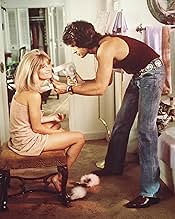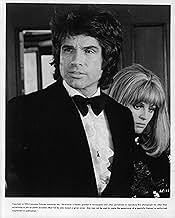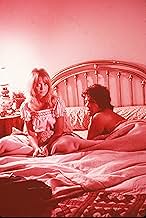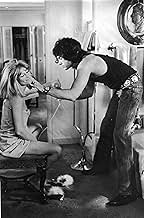Shampoo
- 1975
- Tous publics
- 1h 50m
On Election Day, 1968, irresponsible hairdresser and ladies' man George Roundy is too busy cutting hair and dealing with his girlfriends and mistress Felicia Karpf, whose husband Lester is h... Read allOn Election Day, 1968, irresponsible hairdresser and ladies' man George Roundy is too busy cutting hair and dealing with his girlfriends and mistress Felicia Karpf, whose husband Lester is having an affair with his ex-girlfriend Jackie.On Election Day, 1968, irresponsible hairdresser and ladies' man George Roundy is too busy cutting hair and dealing with his girlfriends and mistress Felicia Karpf, whose husband Lester is having an affair with his ex-girlfriend Jackie.
- Won 1 Oscar
- 3 wins & 11 nominations total
- Director
- Writers
- All cast & crew
- Production, box office & more at IMDbPro
Featured reviews
Here in the updated "Shampoo", Beatty and Towne make the hero an assumed-to-be-gay hairdresser (instead of impotent)and the results are inspired bedroom farce mixed with social satire.
Younger viewers may find the film a little dated but it was a "period" film when it was made (set in 68 when it was shot in 74) so Ashby consciously gave it that dated look. For me this and Heaven Can Wait are Beatty's best work. Walks a fine comic/tragic line. And this really feels like the closest character to Beatty's heart. It was after this that I went back and saw Splendor in the Grass and began to appreciate Beatty as an actor rather than just a gigolo celebrity.
Great dialogue by Towne, Jack Warden's hilarious and Julie Christie is stunning.
Yet, I cannot blame this film for what it does well, which is portray the life of a man who simply wants a good time and success and an accurate picture of the times of 1968 when Nixon was about to be elected, the Summer of Love was almost upon us and free love was a progressive idea. Yet, this movie seems harder on these characters than would be let on. Perhaps it is a nostalgic look-back to a time when there was a great feeling of new-found freedom but these people didn't know what to do with it. Some also criticize it for being chauvinistic but in reality, the females are the most confident, the most aware of their situations and the only ones able to make sense of what the next step should be.
As you might expect, the acting is very good with Beatty playing the character completely aloof, always in his own world trying to think faster than the situations being thrown at him. He realizes what a mess he's in but also knows he doesn't want out so easy. Goldie Hawn is a wonderful, charming and confident actress whose beauty is secondary to her talent while Julie Christie gives the film's best performance as a conflicted woman who seems to know exactly what she will do despite not letting on. The Academy Awards only recognized Lee Grant and Jack Warden, perhaps because they represent a past age, a world about to get completely swept up in the new era being established during the '60s.
Some see it as a political satire, others see it as an unfunny comedy about the consequences of free love. I see it as both as well as a very smart character study of what not to do but also why it's so fun doing it.
One thing George has consistently wanted to do is open his own hair salon; one day, he turns to Lester and Felicia (Jack Warden and Lee Grant), a wealthy, local-area couple. However, another problem emerges for George and that is the fact that Lester's current mistress (Julie Christie) is one of George's former girlfriends. Lester just outright assumes George, because of his appearance and choice of occupation, is gay, and doesn't see him as any legitimate sexual threat. It isn't until George becomes closer to Lester, meeting his wife, rekindling things with Lester's mistress, and even becoming entranced with select other women that George succumbs to furthering his pedigree as a sexual deviant.
Shampoo subtly evokes the breakdown of the limiting and often sexually regressive sexual politics and standards of the 1960's; it plays similar instruments as Paul Mazursky's brilliant and underrated Bob & Carol & Ted & Alice where the very nature of its plot is subversive because it takes a sensitive, introspective camera into characters' bedrooms rather than simply closing the door on it. It's a period of time in American cinema that I cheekily bill "what I do in the bedroom is all of your business," due to the liberal mindset and furtherance of sexual freedom, orientation, and behavior in public. In the contemporary, sex is still a social taboo in America, but with each year, be it what is accepted by the MPAA, or what is casually discussed by young people in a serious, social setting, the stigma of sex is continuing to be broken in many ways.
Shampoo looks at the social mores by picking a character who is contemptible not because he loves his sex but because of how dishonest he chooses to be. There's nothing wrong with having multiple sexual partners, nor is there nothing inherently wrong with practicing polygamy or sleeping around. There is something wrong, however, with being dishonest or deceptive about it, which is what George consistently is. With that, screenwriters Robert Towne and Beatty seem to recognize this, and Beatty himself seems to recognize it as he's playing the character. Nonetheless, he challenges you to like him largely by the quick-witted and zippy way he moves and conducts himself, as well as the way he works and entertains his clients. He may not be an easy character to like, but he's not an easy character to write off.
With that, Beatty gives an entertaining performance and effective turns an ensemble film into what could easily be mistaken as a one-man show, if it wasn't for the significant presences of Goldie Hawn and Lee Grant, specifically Grant who winds up having some strong scenes with Beatty during more pivotal moments of the film. These inclusions make Shampoo more likable throughout all the contemptible attributes of the film, and the film winds up addressing sexual politics in a way that doesn't tell the audience, but show them. It sort of walks in circles, not always coming to a clear point, but Beatty's performance and its more subtler approach to the material is enough to make it, if nothing else, a thematically and fundamentally interesting piece for the time.
Starring: Warren Beatty, Goldie Hawn, Julie Christie, Jack Warden, and Lee Grant. Directed by: Hal Ashby.
Structurally, "Shampoo" is brilliantly devised. Each character has an opposite. George, the satyr, has Lester, the cuckhold, as his opposite. George exudes natural sexual appeal, whereas Lester is loved merely for his wealth. Tony Bill's character, an ad executive, is the younger version of Lester. Tony Bill dangles a job offer to Goldie Hawn in order to bed her. Despite his hip outward appearance, this character is as staid as Lester. In fact, the two characters are linked by separate scenes in which each one stares out of a skyscraper window, gazing at a panoramic view of L.A., and makes a world-weary comment about the craziness below (in Bill's case, he says, "Jesus, this town"). There is also a contrast between George and Jackie. George, in his own words, "doesn't f*** for money, I do it for fun," whereas Jackie ends up as a kept girl (by Lester). Goldie Hawn's character also prostitutes herself, in a very subtle way. In the moral universe of Beverly Hills in 1968, Beatty's promiscuity seems more pure than the money-driven machinations of everyone else.
Did you know
- TriviaLovers off and on since 1967, Warren Beatty and Julie Christie broke up for good during the making of this movie. They remained friends and later worked together in Le ciel peut attendre (1978).
- GoofsThe Coca-Cola can George drinks from while chatting with Lorna is a post-1968 design.
- Quotes
George Roundy: Can't we just, eh, be friends?
Lorna: Okay.
[teen-aged Lorna makes George an offer he can't refuse]
Lorna: You wanna fuck?
- Crazy creditsIn the opening credits, horror film producer/actor William Castle is billed as "Bill Castle," but in the end credits he is back to "William Castle."
- ConnectionsFeatured in Precious Images (1986)
- SoundtracksWouldn't It Be Nice
(1966) (uncredited)
Music by Brian Wilson
Lyrics by Tony Asher, Mike Love and Brian Wilson
Performed by The Beach Boys
- How long is Shampoo?Powered by Alexa
Details
- Release date
- Country of origin
- Language
- Also known as
- Shampooing
- Filming locations
- 2270 Bowmont Drive, Beverly Hills, California, USA(Jackie's House at Bowmont & Hazen)
- Production companies
- See more company credits at IMDbPro
Box office
- Budget
- $4,000,000 (estimated)
- Gross US & Canada
- $49,407,734
- Gross worldwide
- $49,407,734
Contribute to this page


































